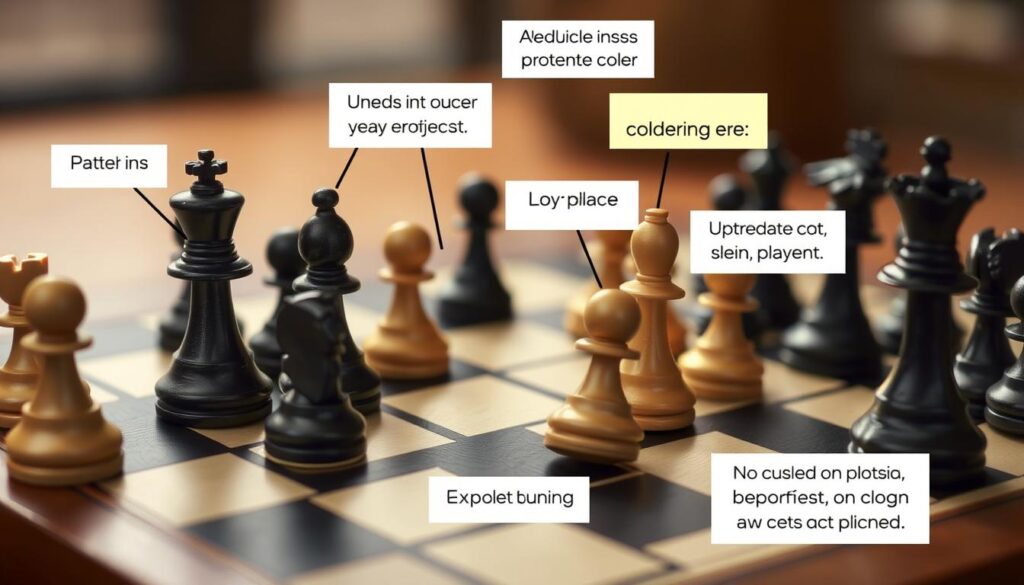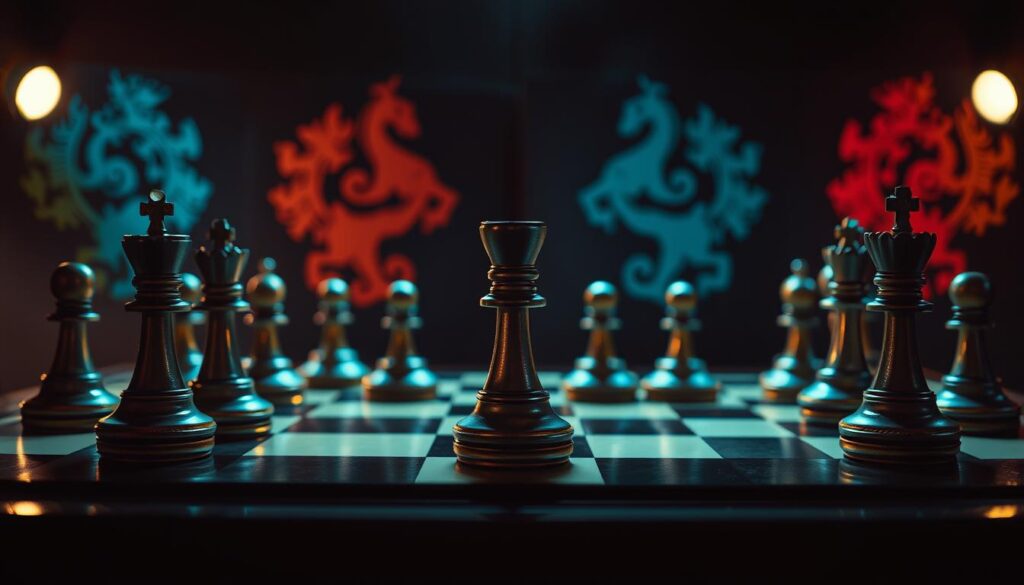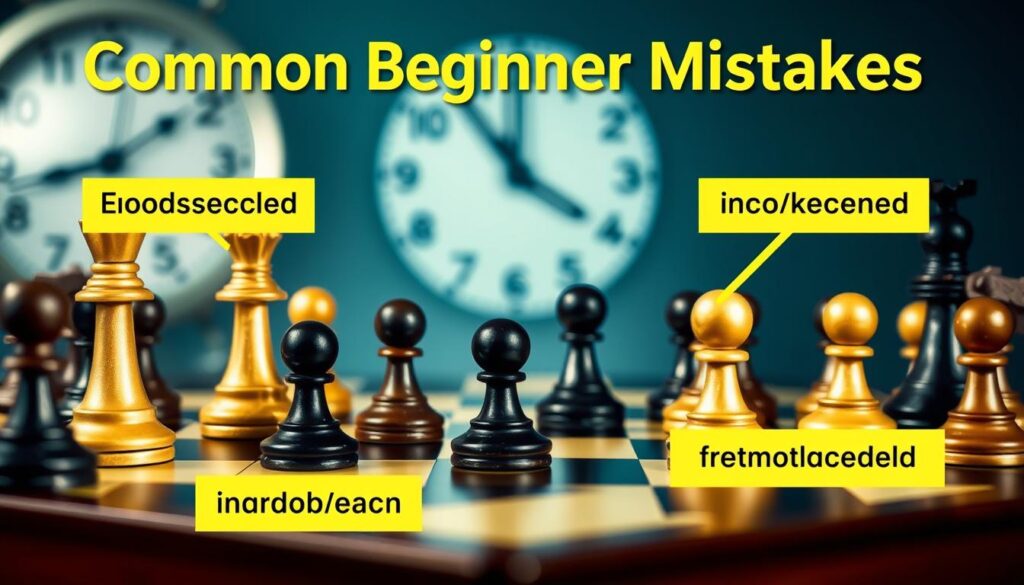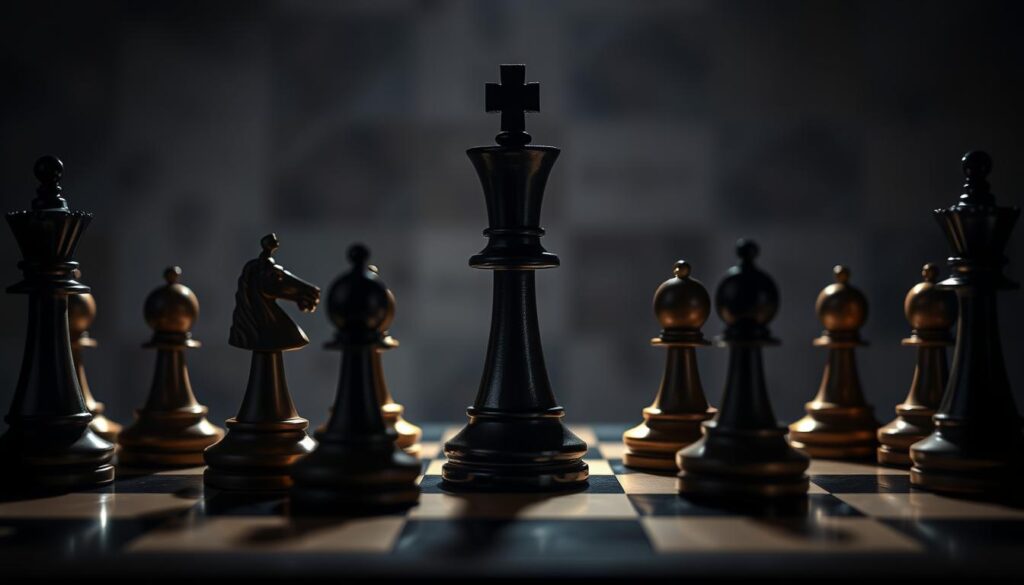Starting your chess journey, you’ll find mistakes are part of learning. Knowing common errors can greatly improve your game. Many beginners face similar challenges. Understanding these mistakes can help you avoid them and improve.
Learning from others, like Jesus de la Villa, can speed up your progress. His book, “50 Mistakes You Should Know,” offers valuable lessons. Remember, avoiding common mistakes is crucial for skill improvement.
Table of Contents
Understanding Why Chess Beginners Make Common Mistakes
As a beginner chess player, you’ll make mistakes. But knowing why you make them is key to getting better. Beginners often make mistakes because they lack experience and practice. The more you play, the better you get and the more you learn to avoid traps.
Some common mistakes include not protecting the king, not moving pieces well, and weak pawn structures. These can cost you a lot, like losing material or the game. To avoid these, focus on strategy, not just quick moves. It’s important to control the center, think ahead, and use your pieces wisely.
Here are some key strategies for beginners:
- Control the center of the board to gain a strategic advantage
- Develop your pieces harmoniously to attack your opponent’s position
- Protect your king by castling and placing pieces in front of it
- Use pawns to support your pieces and control key squares

By understanding why beginners make mistakes and how to avoid them, you can get better. Focus on strategy, control the center, and move your pieces well. With practice and patience, you’ll become a skilled player and avoid common mistakes.
| Common Mistake | Description |
|---|---|
| Neglecting king’s safety | Failing to protect the king, leading to checkmate |
| Poor piece development | Failing to develop pieces, leading to a weak attack |
| Weaknesses in pawn structure | Creating weaknesses in the pawn structure, leading to a loss of material |
The Importance of Chess Opening Principles
Starting your chess journey means learning about common mistakes beginners make. The opening phase is key, setting the game’s direction. It’s important to control the center and move your pieces well. This helps you move freely and defend or attack better.
Jesus de la Villa’s book stresses the importance of learning from mistakes. Beginners often forget to control the center or move their pieces right. To avoid these errors, learn the opening principles. This includes controlling the center and moving your pieces well.
Some key principles to remember are:
- Controlling the center with pawns and pieces
- Developing your pieces efficiently
- Avoiding weak pawn structures

Mastering these principles will help you improve and avoid common mistakes. Always practice and review, and don’t hesitate to learn from your mistakes. With hard work and dedication, you’ll become a skilled chess player soon.
Mistakes Beginner Chess Players Make in the Opening Phase
As a beginner chess player, it’s key to know common errors in chess for beginners to get better. The opening phase is crucial, where mistakes can set you back. Beginner chess player mistakes to avoid include moving pawns too much, not developing pieces well, and not castling, leaving the King exposed.
Some common mistakes in the opening phase include:
- Delaying castling, which can result in the King’s safety being compromised
- Not ensuring that the castled King is in a safe position, leaving it open to potential threats
- Closing the position unnecessarily when you should be focusing on attacking
Knowing these common errors in chess for beginners and how to dodge them can greatly enhance your opening play. By avoiding these beginner chess player mistakes to avoid, you can build a stronger base and boost your game overall.

| Mistake | Consequence |
|---|---|
| Not castling | King remains in the center, vulnerable to attacks |
| Delaying castling | King’s safety is compromised |
| Closing the position unnecessarily | Limiting attacking opportunities |
The Fatal Error of Ignoring King Safety
As a novice chess player, you might make common blunders that hurt your game. One big mistake is ignoring king safety. A vulnerable king can be attacked and checkmated easily.
Jesus de la Villa’s book says protecting the king is key to bettering your game. Knowing how to keep your king safe helps prevent attacks. For instance, castling secures the king, and placing pieces in front of it blocks attacks.
Here are some ways to avoid mistakes beginner chess players make:
- Think ahead and analyze moves to spot threats.
- Stay focused during the game to avoid mistakes.
- Study tactics often to get better.
By focusing on king safety and avoiding common blunders for novice chess players, you can win more games. Even experienced players can make mistakes if they don’t watch their king. So, always be alert and ready for any situation.

Development and Piece Coordination Issues
As a beginner in chess, you might find it hard to develop and coordinate your pieces. This can lead to messy and ineffective play. Common pitfalls in chess for beginners often include not moving pieces fast or in sync. This weakens your game. By working on piece development and coordination, you can play better and make fewer mistakes.
To steer clear of beginner chess player mistakes, aim to move your pieces together well. Here’s how:
- Move your pieces fast and in harmony
- Keep control of the board’s center
- Make sure your pieces work together to attack and defend
By sticking to these tips and practicing often, you can get better at moving and coordinating your pieces. This will help you avoid many common pitfalls in chess for beginners. Always keep an eye on how your pieces are moving and look for ways to get better.
| Piece Development | Coordination | Effectiveness |
|---|---|---|
| Quick and harmonious development | Controlling the center of the board | Strong foundation for the game |
| Slow and disorganized development | Failing to coordinate pieces | Weak foundation for the game |
Common Tactical Oversights in Beginner Games
As a beginner chess player, you might make mistakes that cost you the game. Tactical oversights are common, as players often miss and don’t use weaknesses. By learning common mistakes and improving your tactics, you can beat your opponents.
Beginners often hang pieces, ignore their king’s safety, and don’t develop their pieces well. These errors can lead to big losses. Jesus de la Villa’s book offers great advice on improving your tactics, which is very helpful for beginners.
To avoid common mistakes, it’s key to think about and analyze your moves. Stay focused during games and study tactics often. Here are some tips to enhance your tactical play:
- Practice solving puzzles and problems to build your tactical skills
- Study chess books and online resources, such as “Chess Tactics for Champions” by Susan Polgar
- Use online platforms, such as Chess.com and Lichess.org, to access extensive collections of puzzles and problems
By following these tips and knowing common tactical oversights, you can improve your chess game. Always think ahead and consider the outcomes of your moves.
With practice and dedication, you can get better at chess. Start by fixing common tactical oversights, and you’ll improve your game.
| Common Mistakes | Consequences | Solutions |
|---|---|---|
| Hanging pieces | Loss of material | Practice solving puzzles and problems |
| Negligence of king’s safety | Checkmate | Study chess books and online resources |
| Poor piece development | Weak position | Use online platforms to access puzzles and problems |
Time Management and Decision-Making Errors
As a beginner chess player, you often make common blunders for novice chess players. This includes mistakes in time management and decision-making. It’s key to manage your time well to make smart moves during the game. A good tip is to spend about 30 seconds per move in rapid chess.
To steer clear of beginner chess player mistakes to avoid, check how you use your time after the game. This lets you spot if you spend too much or too little on moves. By noticing these trends, you can tweak your time handling to better your game.
Some important ways to get better at time management and decision-making are:
- Focus on making accurate moves rather than rushing them
- Practice often to improve your muscle memory and spot patterns
- Look over your games to find common errors and areas to work on
By using these strategies and working on your time management and decision-making, you can cut down on mistakes. This will make your chess game stronger overall.
| Time Management Strategy | Benefits |
|---|---|
| Allocating 30 seconds per move | Reduces time pressure and allows for more informed decisions |
| Analyzing time usage post-game | Helps identify patterns and areas for improvement |
| Practicing regularly | Develops muscle memory and pattern recognition, leading to improved decision-making |
Strategic Planning Mistakes to Avoid
As a beginner chess player, you might make common pitfalls in chess for beginners. One big mistake is not thinking about the long-term effects of your moves. To get better, it’s key to know the mistakes beginner chess players make and how to dodge them. Jesus de la Villa’s book offers great tips to boost your strategic planning.
Some important strategies to sidestep common pitfalls in chess for beginners include:
- Calculating and analyzing moves carefully
- Concentrating and focusing during the game
- Studying tactics regularly
- Managing time effectively
- Reviewing past games to identify mistakes
By sticking to these strategies and avoiding mistakes beginner chess players make, you can up your win chances. Remember, common pitfalls in chess for beginners can be beaten with practice, patience, and hard work.
As you keep honing your strategic planning, remember that mistakes beginner chess players make are part of learning. The important thing is to learn from these mistakes and use them to grow. With determination and the right advice, you can beat common pitfalls in chess for beginners and become a skilled player.
The Impact of Emotional Decision Making
As a beginner chess player, you face many challenges. One big one is making decisions based on emotions. This can lead to quick, unthoughtful moves. It’s key to control your emotions to avoid mistakes that can cost you the game.
By knowing what triggers your emotions, you can handle them better. This way, you make smarter choices, leading to better results.
Here are some ways to avoid common mistakes for beginners:
- Think strategically by looking at the current board and planning ahead
- Use mental images to see how moves might play out
- Learn patterns to guess what moves might come next
Emotions can be swayed by confidence and pressure. Learning to manage these can make you a better player. As you play more, you’ll get better at recognizing and dealing with your emotions. This will help you improve and understand chess better.
Learning From Your Chess Mistakes
As a novice chess player, you will make mistakes. But, it’s how you learn from them that counts. Common blunders for novice chess players can be avoided by analyzing your games. This helps you find areas to improve.
By doing this, you can make fewer mistakes beginner chess players make. This will make your game better overall.
One way to learn is to review your games and find patterns. Chess software or online resources can help you analyze. You can also learn from others by studying their games and strategies.
Some key takeaways for learning from your chess mistakes include:
- Analyzing your games to identify areas for improvement
- Studying other players’ games and strategies
- Practicing regularly to reinforce new skills
By following these tips, you can improve your game. Remember to stay focused, persistent, and always be willing to learn from your mistakes.
Building Better Chess Habits
As a beginner chess player, it’s key to know common mistakes and avoid them. One great way to get better is to form good habits and steer clear of bad ones. For instance, failing to look for alternatives can cause errors and slow you down. By making it a habit to explore different moves, you can boost your game and cut down on mistakes.
To improve your chess, focus on process-based goals rather than just winning. This means setting goals like practicing tactics for a set time each day or studying endgames for a certain number of hours weekly. This way, you’ll keep getting better and avoid common mistakes.
Here are some ways to build better chess habits:
- Practice tactics with online tools like Chess.com
- Study endgames and learn how to checkmate with different pieces
- Make time each day to study and practice
By following these tips and watching out for common mistakes, you can form good habits and enhance your game. Stay focused, keep trying, and be patient. With time and effort, you’ll become a skilled chess player.
| Topic | Resource | Time Commitment |
|---|---|---|
| Tactics | Chess.com | 30 minutes/day |
| Endgames | YouTube channel | 1 hour/week |
Conclusion: Your Path to Chess Improvement
Improving at chess means avoiding common mistakes. Knowing the common errors in chess for beginners helps a lot. By fixing these errors, you can play better and make fewer mistakes.
Keep learning and applying what you’ve learned. This will help you become a stronger player. Focus on improving your game and you’ll see progress.
Improving at chess is more than just knowing more. It’s about getting better at the game. It’s about learning from mistakes and understanding the game’s basics.
By following the advice in this article, you’re setting a good foundation. Keep learning and growing, and you’ll reach new levels in chess. Every mistake is a chance to learn, and every win shows your hard work.
FAQ
What are the common mistakes beginner chess players make?
Beginners often forget to control the center and develop pieces poorly. They also ignore king safety and lack coordination. Plus, they sometimes miss tactical moves.
Why do chess beginners make these common mistakes?
Beginners make mistakes because they lack experience and practice. As they play more, they learn to avoid these errors and develop better strategies.
How can beginner chess players avoid mistakes in the opening phase?
Beginners should focus on controlling the center and developing pieces well. Understanding opening principles is also key.
What are the consequences of ignoring king safety in chess?
Ignoring king safety can be deadly. It makes the king vulnerable to attacks. Beginners should prioritize king safety by castling and protecting the king with pieces.
How can beginner chess players improve their development and piece coordination?
Beginners need to develop pieces quickly and harmoniously. They should also coordinate their pieces to create strong attacks.
What are common tactical oversights in beginner chess games?
Beginners often miss tactical opportunities. They fail to spot and exploit their opponent’s weaknesses. Improving tactical skills can give them an edge.
How can beginner chess players improve their time management and decision-making?
Time management and decision-making are key. Beginners can improve by managing their time well and making informed decisions based on the game’s position.
What are common strategic planning mistakes that beginner chess players make?
Beginners may struggle with strategic planning. They might not consider long-term effects or execute plans well. Better strategic thinking can improve their game.
How can emotional decision-making impact a beginner’s chess game?
Emotional decisions can lead to impulsive moves. These can harm a beginner’s game. Learning to manage emotions and make informed decisions is crucial.
Why is it important for beginner chess players to learn from their mistakes?
Learning from mistakes is vital for improvement. Analyzing games and improving from past errors can enhance a beginner’s game and reduce mistakes.
What are some good chess habits that beginner players should develop?
Good habits like looking for alternatives and avoiding impulsive moves are essential. These habits can improve a beginner’s game and reduce mistakes.

















